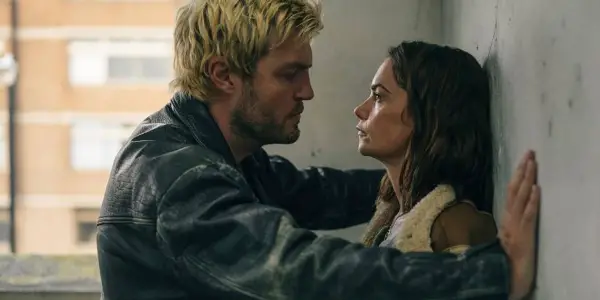Kate (Ruth Wilson) adds the contact of a charming stranger on her phone simply as “Blond” (Tom Burke), the adjective standing in for a name she does not know. Blonde are the frosted tips of his unwashed hair, which sit like a shiny new dormer on a crumbling house — a half-hearted attempt to spruce up the undeniably tired. A customer service assistant at a benefits office, Kate spends her days aimlessly staring at screens, from the computer to her phone to the computer once again, the dullness of the routine broken only by the occasional bouts of aggression from frustrated claimers.
From Charming to Obliterating
Aggression, however, is the opposite of what Blond offers when he sits on the cold chair in front of her, looking entirely comfortable despite the discomfort of the predicament. He nonchalantly mentions his time in prison and promptly answers “Single. Very.” when Kate asks about his marital status — for the forms, sure, but also with a brewing curiosity that gets her blushing at the assertiveness of his response. By the time Kate leaves work, the man is waiting for her by the door.

Blond calls everyone “darling” with such confident charm one would think it is a long-brewed private quip instead of a mere generic adjective. As if turning on a switch, however, the easiness of his manners is replaced by bone-chilling cruelty, the man as surgically capable of controlling his rage as he is his charm. Words become lethal in Blond’s obliterating tongue, which gives pleasure with the same gusto as it takes it away.
A Potent portrayal of Toxic Relationships
Wootliff nails in the head the portrayal of one of the most complex aspects of toxic relationships: the fact that they aren’t solely built on emotional co-dependency, but also on the highly addictive thrill of being wanted. Blond stares at Kate as if she is prey, evoking the primal-ness of desire that is often repressed by women of her age, who are told time and time again that there is no point in pursuing anything that won’t lead to the glorified institutions of marriage and motherhood. With Blond, Kate can groan and moan and feel. And, oh, how she feels. Her mouth contorts at the height of climax as Wootliff rests the camera on her face, her crooks and crevasses turned frame, her pleasure a work of art.
With True Things – as in her 2019 directorial debut Only You – Wootliff creates something so excruciatingly intimate that watching feels akin to peeping. Here, all feels raw, from the moments of sizzling sensuality to the forays into the darkest pits of despair. Through her performance as Kate, Wilson conveys loneliness with frightening skill – even the act of opening the door of an empty cupboard is loaded, her command of vulnerability mesmerising to watch.
“No one likes me”, Kate mutters under her breath, her body struggling not to bow to the instinctive urge of curling into a fetal position. It is a simple yet charged statement, and it encompasses much of what lies at the core of True Things: our inherent need to be liked – to like back.
What are some of your favourite films about toxic relationships? Tell us in the comments!
True Things had its world premiere at the 78th Venice Film Festival.
Does content like this matter to you?
Become a Member and support film journalism. Unlock access to all of Film Inquiry`s great articles. Join a community of like-minded readers who are passionate about cinema - get access to our private members Network, give back to independent filmmakers, and more.